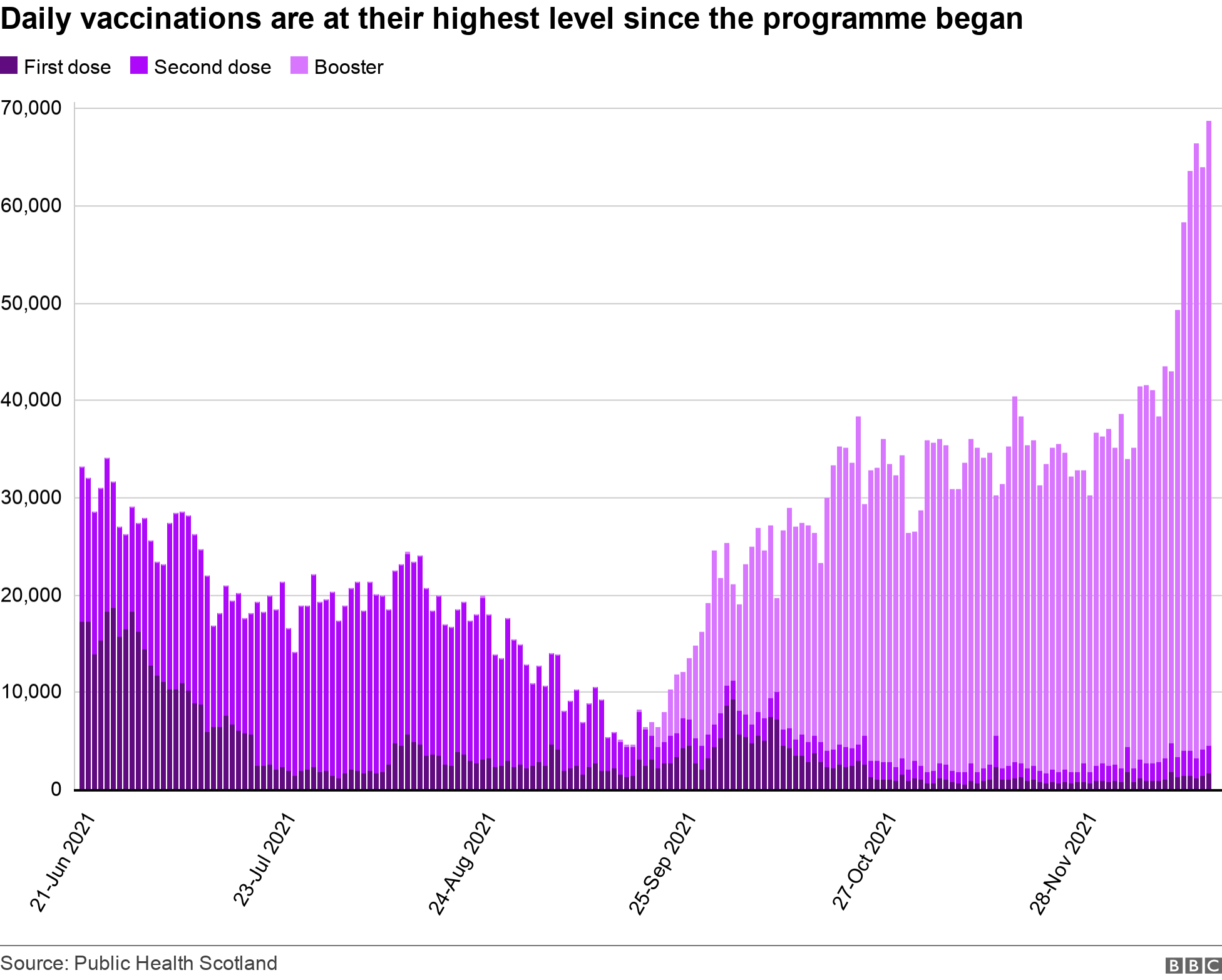Models suggest a peak in Scotland in late January or early February, according to Prof Jason Leitch.
This video can not be played
To play this video you need to enable JavaScript in your browser.
Scotland is “nowhere near” the peak of the Omicron wave, with cases likely to double or treble in coming days, the national clinical director has said.
Jason Leitch told BBC Scotland that models suggested a late January or early February peak and a sharp rise in deaths and hospital admissions.
But Prof Leitch said Scotland was not “powerless” and could fight to reduce or delay the peak.
A return to stricter lockdown measure was also not “inevitable”, he added.
Omicron is much more infectious than previous Covid strains and now accounts for more than half of all Scottish cases.
The total number of positive tests has also been rising since the end of November, when Omicron was first detected in Scotland.
Speaking on BBC Radio Scotland’s Lunchtime Live programme, Prof Leitch said: “Positive cases were rising over the weekend. We approached over 5,000 – I’m expecting that to go up again today and for the rest of this week.
“I’m afraid we’re not in the foothills any more of this Omicron wave, we’re in it.”

In leaked minutes seen by the BBC last week, the Scientific Advisory Group for Emergencies suggested that if no further restrictions were introduced, UK hospital admissions could peak at between 3,000 and 10,000 a day – and deaths between 600 and 6,000.
Prof Leitch said this could translate to between 60 and 600 Covid deaths a day in Scotland, but added there was not yet enough data on Omicron to know for sure.
He told BBC Scotland that hospital admissions for Covid would begin to rise soon, reflecting the recent increase in cases.
“We are very hopeful that Omicron might not be as severe, so you might not get as many hospitalisations per 100 people,” he said.
“But the fact you’re going to get double, treble the number of cases means it’s not long before our hospitals really struggle – and our hospitals are already finding it very challenging because of winter, postponed care, other diseases and some Covid.”
Prof Leitch said it was not inevitable that hospitals would be overwhelmed, but warned of “difficult choices” around patient care as they became “very, very busy”.
“The modelling suggests the peak of this wave is a little bit unpredictable, but probably into late January, early February, so that gives you some idea of where we’re headed,” he said.
“But we’re not powerless. There are things we can do to make that peak smaller and perhaps even delay it to give us more time, because the more we delay, the more we vaccinate.”
He said it was key that people reduced their socialising as much as they could and maintained social distancing with people outside their household.

A speedy booster programme is considered vital in tackling the threat of Omicron as the third dose appears to offer much more protection against the strain.
The Scottish government has said it wants to give the booster to 80% of all eligible adults by the end of the year, and the number of daily vaccinations has gone up to more than 60,000 a day since the end of last week.
About 6,700 new cases were confirmed on Monday, but Public Health Scotland said the results of many tests were delayed because of the “larger volumes” being processed by labs.
The fast rise in cases has led to hints that tougher Covid restrictions could be introduced around the new year.
Prof Leitch told BBC Scotland that Omicron needed a “fast and hard” response, but said a full lockdown was not “inevitable”.
“I don’t think we’ll go back to what we knew as lockdown right at the beginning, [because of] the other harms – economic, educational, the mental health harms,” he said.
“I think the politicians around the world will have to consider other protections, but that will depend on the state of the pandemic and their environment – Scotland included – but also dependent on what you can do financially.”

